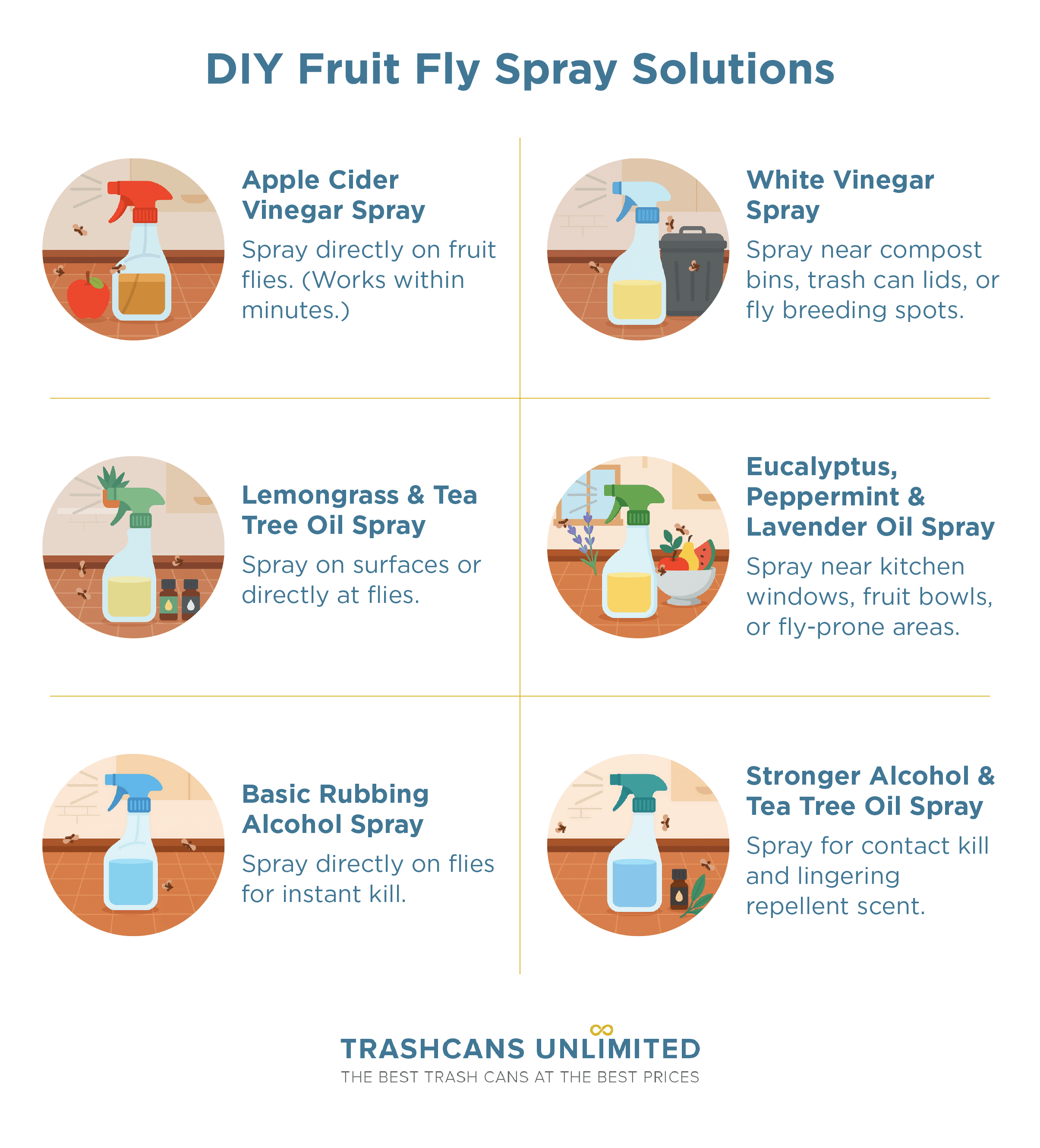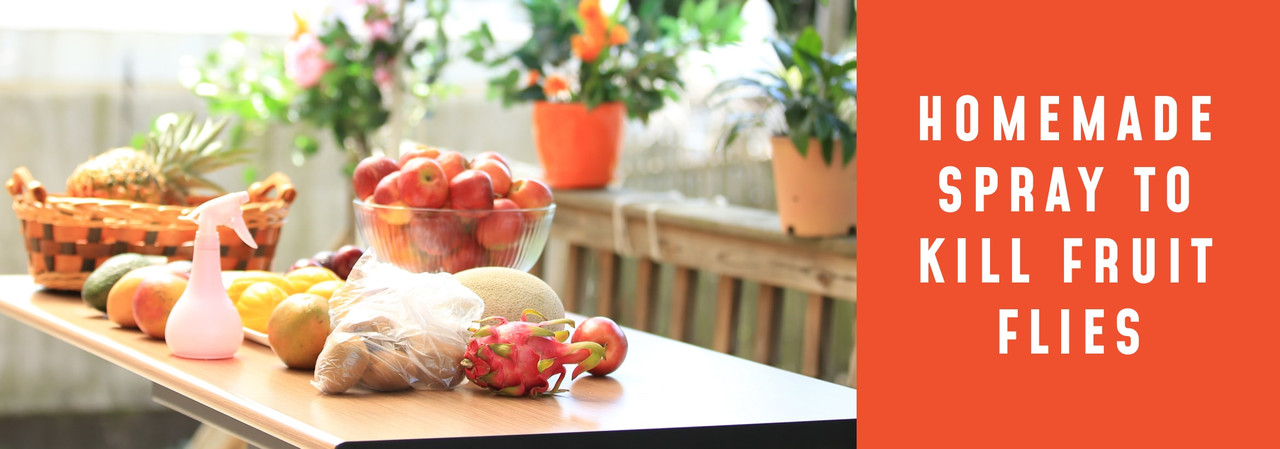You’re trying to cook, clean, or just enjoy your kitchen, and there they are. Fruit flies buzzing around your face, landing on your food, and making a spotless space feel dirty. It’s frustrating, and it only gets worse the longer they hang around. The good news? You don’t need harsh sprays or expensive traps. With a few basic ingredients like apple cider vinegar, dish soap, and water, you can make a simple homemade spray to kill fruit flies that works fast and keeps your kitchen safe.
Key Takeaways
- DIY fruit fly sprays made with everyday kitchen items can eliminate fruit flies fast.
- Consistent cleaning and food storage habits prevent fruit fly infestations.
- You can ditch chemicals and still get visible, immediate results.
Why Do Fruit Flies Invade Your Kitchen?
Fruit flies aren’t random visitors. They follow the scent of fermenting produce with uncanny precision. They’re on a mission for food and breeding grounds, and our kitchens usually offer both. It doesn’t take much. Just one forgotten apple or overripe banana can kick off an infestation overnight.
Their top targets are ripening or rotting fruits—bananas, tomatoes, peaches, and more—left exposed on counters or in bowls. The sweet smell of decay is their invitation to come in and stay a while. We’ve all been there. Lifting the banana bunch and finding a cloud of flies that makes your stomach turn.
And they don’t just magically appear. Most arrive as invisible stowaways on the fruits and vegetables we bring home from stores or markets. What seems like a fresh bunch of grapes could already carry the beginnings of an infestation.
Some of the biggest attractants in kitchens include:
- Overripe produce left uncovered
- Sticky wine or juice spills
- Damp rags and mop heads
- Dirty disposals and trash bins
- Recycling with unwashed bottles
- Sinks and drains with lingering food residue
Warm conditions speed up their life cycle dramatically. A single female can lay up to 500 eggs, and under the right circumstances, those eggs hatch in just one day. That means an infestation can explode in hours, not days, if nothing is done.
If you’re wondering how to get rid of fruit flies, this is your cue: it starts with prevention. Even spotless kitchens aren’t safe. Moisture under your sink or crumbs in the drain are more than enough to keep the swarm going.
Late summer through early fall tends to be the worst window, with plenty of fruit available and the right temperature conditions for them to breed nonstop.
Homemade Spray to Kill Fruit Flies
Homemade sprays work well when you get the mix right and spray with intention. These natural combos are effective, simple to prepare, and safe to use around food and family.
Vinegar-Based Sprays
Apple cider vinegar works wonders because fruit flies can’t resist the smell. Mix 1 cup of it with 2 tablespoons of dish soap and 2 cups of warm water in a spray bottle. This quick mix works within minutes when sprayed directly on flies, making it a reliable go-to if you’re wondering how to get rid of fruit flies with what you already have at home.
Need something with more bite? White vinegar has a stronger acidity. Mix equal parts white vinegar and water, add 10 drops of dish soap, and get a spray that cuts through fly clusters fast. Try it near compost bins or trash can lids, places where the flies settle and breed.
To make either version even more effective, steep fresh basil or mint in the mixture for an hour before straining it into the spray bottle. The added aroma may draw flies in faster. Plus, it leaves your kitchen smelling cleaner.
Essential Oil Spray Formulations
Essential oils act as natural repellents. They’re perfect when you want to keep flies away from clean areas after you’ve cleared them out.
Blend 2 cups of water with 15 drops each of lemongrass and tea tree oil. Add 1 teaspoon dish soap so the oils mix evenly. This homemade spray to kill fruit flies is safe to spray around kids and pets, but still tough on flies.
Another great essential oil combo:
- 10 drops eucalyptus oil
- 10 drops peppermint oil
- 8 drops lavender oil
- 2 cups water
- 1 teaspoon dish soap
If you’re exploring how to get rid of fruit flies without harsh chemicals, essential oils are a safe, effective option. This blend is ideal for spraying around kitchen windows or near fruit bowls to keep flies from coming back.
Shake before each use to ensure the oils are well-distributed and ready to coat surfaces or knock flies out of the air. Many users notice fewer flies after just one use.
Alcohol-Based Solutions
For a direct and fast-acting DIY fruit fly spray, rubbing alcohol can dehydrate fruit flies quickly. Mix ½ cup rubbing alcohol with ½ cup water and 1 teaspoon dish soap. Spray it directly on fruit flies and watch them drop instantly.
For something stronger, go with:
- ¾ cup rubbing alcohol
- ¼ cup water
- 10 drops tea tree oil
- 1 teaspoon dish soap
This version not only kills on contact, but it also leaves behind a scent that keeps new flies away. Great for end-of-day cleanups when you want to reclaim your kitchen.
Store these in dark bottles to prevent the alcohol from breaking down over time, especially if you’re adding essential oils.

Application Techniques
Aim sprays directly at flies when you see them, holding the bottle 6–8 inches away. Spritz window edges, sink drains, fruit baskets, and anywhere they’ve been hovering. It’s so satisfying to see them drop instantly after a direct spray.
Flies are less active early in the morning or late evening, which makes those times ideal for treating problem areas. Use that quiet window to hit high-traffic fly zones and get ahead of the next wave.
Repeat every 2–3 days, and keep cleaning in between to disrupt their ability to return. After just two days of spraying and removing old produce, you will see a complete drop in fly activity.
If you’re unsure about your surfaces, always do a spot test first to avoid discoloration, especially on stone or wood countertops.
Identifying Fruit Fly Hotspots
If you want the homemade spray to kill fruit flies, you first need to know where to aim. Fruit flies (Drosophila melanogaster) cluster around food sources and moist places ideal for laying eggs. Targeting these zones means your homemade spray kills on contact and stops the next wave before it starts.
The biggest magnet is usually the kitchen sink—dirty dishes, lingering crumbs, and food-laced water all create the perfect environment. Fruit bowls loaded with soft, sweet produce are another guaranteed trouble spot.
Don’t forget the trash. Fruit flies lay eggs in damp, decomposing waste. Left alone, one bin can support an entire population. Even one missed banana peel can lead to a swarm. One of the best ways to prevent fruit fly infestations is to clean these high-risk areas regularly and spray them with your homemade mix.
Watch these known hotspots closely:
- Kitchen drains and disposals
- Houseplant soil with excess moisture
- Used wine, beer, or soda bottles
- Mop water, sponges, and rags
- Countertop fruit baskets
- Compost containers indoors or out
To figure out exactly where they’re hanging out, try leaving a piece of ripe fruit in various locations. Check after 30 minutes. Wherever the most flies gather is your top breeding zone. This ensures you spray smarter, not harder, and see faster results.
Fruit flies live their full lives in your kitchen. By finding and hitting the right spots, you can break the cycle and clear your space fast.
Prevention and Maintenance
Fruit fly control doesn’t end with a spray bottle. You’ll need good habits and a few setup changes to keep them from coming back. The goal isn’t just to get rid of them. It’s to keep them gone for good.
Kitchen Hygiene Practices
The less fruit flies have to feed on, the less reason they have to stay. Keep fruit sealed or refrigerated, especially once it starts to ripen. Any bruised or overripe produce should be removed immediately. It doesn’t take much to trigger a new wave. One soft tomato on the counter is all it takes.
Wipe your counters with a vinegar-water cleaner every day. This helps remove residues you can’t see, which fruit flies detect long before we do. And don’t leave dishes sitting overnight. They’re magnets for tiny pests. Just one night of dishes in the sink can undo all your progress.
Garbage disposals and drains need weekly attention. Scrub them with a brush and use an enzymatic cleaner to flush out gunk they can breed in. It’s quick work and pays off. Clean drains can help break the life cycle completely and prevent fruit fly infestations from recurring.
Trash bins should be emptied regularly and always lined with bags. Even a little food juice at the bottom of your trash can is enough to start things all over again. A clean bin keeps flies from finding their way back.
Environmental Controls
Physical barriers help. Mesh screens on windows and doors are your first line of defense. Make sure they’re intact and fitted well. No gaps means no re-entry.
Let houseplant soil dry between waterings. Constantly damp soil isn’t just a fruit fly problem, it can attract fungus gnats too. If you're seeing bugs near your plants, this might be why.
Set vinegar traps near fruit bowls and garbage cans to detect early signs of a comeback. If you spot even one fly in a trap, it’s your cue to act fast. Grab your DIY fruit fly spray and stop the next swarm before it starts. Early detection and targeted spraying are some of the most effective ways to prevent fruit fly infestations in the first place.
If you compost, keep indoor containers covered and take scraps out daily. Keep the outdoor bin at least 20 feet away from your door so it doesn’t become a highway for flies to your kitchen. This one move can cut down on repeat infestations dramatically.
Say Goodbye to Kitchen Pests with a Homemade Spray to Kill Fruit Flies
Fruit flies don’t wait, and now, neither do you. With a homemade spray to kill fruit flies and smarter habits, you can clear out a kitchen full of fruit flies in minutes, without relying on harsh chemicals or overpriced traps. These homemade solutions work fast and are safe to use around your family. Once you’ve broken the cycle, your focus shifts to prevention: clean drains, sealed produce, dry sinks, and yes, a proper trash setup.
Don’t let a leaky or uncovered bin undo your hard work. A quality trash can with a secure lid is one of the best defenses you can invest in to stop fruit flies before they start. Check out our high quality kitchen step-on trash cans because a clean kitchen deserves a better bin.

